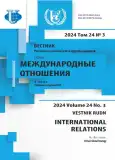Курс на Север: арктическая политика Китая в контексте глобальных геополитических изменений
- Авторы: Рекец М.О.1
-
Учреждения:
- Российский университет дружбы народов
- Выпуск: Том 24, № 3 (2024): Глобальная стратегия КНР
- Страницы: 371-384
- Раздел: ТЕМАТИЧЕСКОЕ ДОСЬЕ
- URL: https://journal-vniispk.ru/2313-0660/article/view/320687
- DOI: https://doi.org/10.22363/2313-0660-2024-24-3-371-384
- EDN: https://elibrary.ru/ZKBWOA
- ID: 320687
Цитировать
Аннотация
С начала 2000-х гг. Китай прилагает последовательные и настойчивые усилия по проникновению в Арктический регион и закреплению в нем в качестве полноценного участника международных политических и экономических процессов, претендуя на статус полноправного актора системы управления Арктикой. Актуальность темы исследования определяется стратегическим значением Арктики для интересов Российской Федерации и обусловленной этим потребностью выстраивать выверенный внешнеполитический курс на основе объективной оценки политики ключевых «игроков» в данном регионе, одним из которых становится Китай, наращивающий свое присутствие в Заполярье. Несмотря на значительное число работ российских и зарубежных исследователей по различным аспектам арктической политики Пекина, недостаточно изученным остается вопрос долгосрочных задач Китая в Арктике в контексте реализуемой им стратегии трансформации системы мирового управления. Автор ставит целью определение ключевых движущих факторов арктической политики Китайской Народной Республики (КНР) и оценку потенциальных угроз интересам России при реализации Китаем своих подходов к значимым вопросам будущего развития региона. Исследование осуществлено с опорой на теорию наступательного реализма, которая позволяет обосновывать высокую степень конкуренции мировых держав в геополитическом пространстве Арктики и объяснить значительный наступательный потенциал внешней политики Китая, в том числе на северном направлении. Использованы институциональный, логический методы и метод экспертной оценки. В основу положен системный подход к рассмотрению арктической политики КНР в совокупности ее различных элементов и меняющейся международной среды, а в более широком контексте - глобальной внешнеполитической стратегии Пекина. На основе анализа политики Китая на арктическом направлении за минувшее десятилетие выявляются риски, связанные с интенсивным привлечением китайского капитала в инфраструктурные проекты в высоких широтах и встраиванием российского северного логистического маршрута во всеобъемлющую китайскую инициативу «Пояс и путь», которая направлена на трансформацию мировой экономической системы и структуры международных отношений в интересах КНР.
Ключевые слова
Об авторах
Марина Олеговна Рекец
Российский университет дружбы народов
Автор, ответственный за переписку.
Email: rekets-mo@rudn.ru
ORCID iD: 0009-0001-2387-6481
SPIN-код: 2232-0497
кандидат политических наук, доцент кафедры теории и истории международных отношений; проректор по международной деятельности
Москва, Российская ФедерацияСписок литературы
- Boyarkina, A. V. (2020). China’s Belt and Road Initiative in the context of Jinping Xi’s conception of the Community of common destiny for mankind. Teorii i Problemy Politicheskikh Issledovanii, 9(1A), 120-140. (In Russian). EDN: STTVTM
- Boyarkina, A. V. (2023). Foreign policy concepts of the People's Republic of China: Theoretical conception and practical implementation. Vladivostok: Izdatel’stvo Dal’nevostochnogo federal’nogo universiteta publ. (In Russian). https://doi.org/10.24866/7444-5485-2; EDN: WZPWJX
- Brady, A.-M. (2017). China as a polar great power. Cambridge: Cambridge University Press. https://doi.org/10.1017/9781316832004
- Cui, Long. (2024). Chinese research on the Arctic (historical aspect). Rossiya v Global’nom Mire, 27(1), 140-153. (In Russian). https://doi.org/10.48612/rg/RGW.27.1.9; EDN: YBHGPG
- Denisov, I. E., & Adamova, D. L. (2017). Xi Jinping’s foreign policy rhetoric: Main features and issues of interpretation. China in World and Regional Politics. History and Modernity, 22(22), 76-90. (In Russian). https://doi.org/10.24411/9785-0324-2017-00006; EDN: ZNLLXV
- Filippova, L. V. (2019). China’s Arctic research potential. China in World and Regional Politics. History and Modernity, 24(24), 279-295. (In Russian). https://doi.org/10.24411/2618-6888-2019-10016; EDN: UOFMKK
- Gong, Keyu. (2020). A shifting Northeast Asian security landscape and China - ROK - Japan Arctic cooperation. The Journal of East Asian Affairs, 33(2), 59-81.
- Komissina, I. N. (2015). The Arctic vector of China’s foreign policy. National Strategy Issues, (1), 54-73. (In Russian). EDN: TSKFUH
- Larin, V. L., & Pestsov, S. K. (2020). The emergence of China as a “great maritime power”. Outlines of Global Transformations: Politics, Economics, Law, 13(3), 27-46. (In Russian). https://doi.org/10.23932/2542-0240-2020-13-3-2; EDN: UVJNKJ
- Lei, Shuang. (2021). China’s positioning in the Arctic: Evolution of concepts and promotion mechanisms. Pacific Rim: Economics, Politics, Law, 24(4), 99-110. (In Russian). https://doi.org/10.24866/1813-3274/2021-4/99-110; EDN: KGZNNO
- Leksyutina, Ya. V. (2018). China, great power responsibility, and global leadership. International Trends / Mezhdunarodnye Protsessy, 16(2), 60-72. (In Russian). https://doi.org/10.17994/IT.2018.16.2.53.4; EDN: VQUPBG
- Mearsheimer, J. J. (2001). The tragedy of great power politics. New York: W. W. Norton & Company.
- Nong, Hong. (2020). China’s role in the Arctic: Observing and being observed. New York, NY: Routledge. https://doi.org/10.4324/9780429328138
- Petrovsky, V. E., & Filippova, L. V. (2018). China’s strategy towards the Arctic and prospects of Russian-Chinese cooperation in the region. China in World and Regional Politics. History and Modernity, 23(23), 171-182. (In Russian). https://doi.org/10.24411/2618-6888-2018-10013; EDN: PLLETU
- Petrovsky, V. E., & Filippova, L. V. (2022). Russia and China in the Arctic. Moscow: Ves’ mir publ. (In Russian). EDN: RNWAZL
- Sazonov, S. L. (2021). China’s maritime transport and new contours of global transit traffic in post-pandemic conditions. China in World and Regional Politics. History and Modernity, 26(26), 371-386. (In Russian). https://doi.org/10.24412/2618-6888-2021-26-371-386; EDN: KVZFCK
- Semenov, A.V., & Tsvyk, A. V. (2019). The “Community of a shared future for humankind” concept in China’s foreign policy strategy. World Economy and International Relations, 63(8), 72-81. (In Russian). https://doi.org/10.20542/0131-2227-2019-63-8-72-81; EDN: JUYIVV
- Skripkar, M. V. (2015). Formation of the concept of “Chinese Dream” from Sun Yat-sen to Xi Jinping. Mezhdunarodnyi Zhurnal Prikladnykh i Fundamental’nykh Issledovanii, (8-2), 394-397. (In Russian). EDN: UGYDIN
- Steinveg, B. (2021). The role of conferences within Arctic governance. Polar Geography, 44(1), 37-54. https://doi.org/10.1080/1088937X.2020.1798540
- Steinveg, B., Rottem, S. V., & Andreeva, S. (2023). Soft institutions in Arctic governance - who does what? Polar Record, 60(e1), 1-7. https://doi.org/10.1017/S0032247423000335
- Verchenko, A. L. (2020). China’s promotion of the idea of “Community of common destiny for mankind”. East Asia: Facts and Analytics, (1), 6-18. (In Russian) EDN: GDEHEQ
- Vylegzhanin, A. N., & Kienko, E. V. (2021). Consultative meetings of non-Arctic states on the status of the Arctic. Vestnik of Saint Petersburg University. Law, 12(2), 296-318. https://doi.org/10.21638/spbu14.2021.204; EDN: KGWKFH
- Xu, Guangmiao. (2016). China’s Arctic interests and policy: History, legal ground and implementation. World Economy and International Relations, 60(2), 52-62. (In Russian). https://doi.org/10.20542/0131-2227-2016-60-2-52-62; EDN: VVTOKJ
Дополнительные файлы









